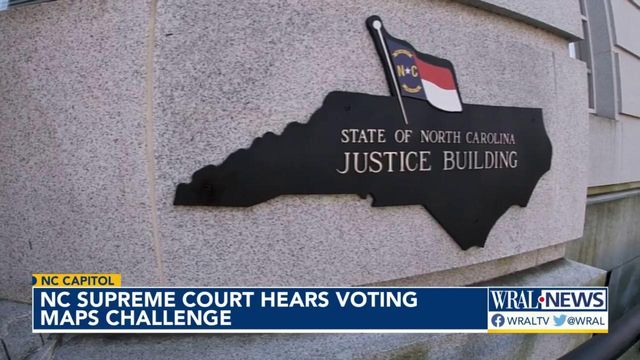NC Supreme Court wrestles with how, whether to constrain partisanship in redistricting
North Carolina’s high court grappled Wednesday over whether to crack down on partisan gerrymandering in the state and, if so, how courts can draw a bright line between permissible partisanship and an unconstitutional entrenchment of legislative power.
The court’s decision could set a far-reaching precedent, potentially changing the way election maps are drawn in the state in a manner that may ultimately shift power in the General Assembly and, to a lesser extent, the U.S. Congress.
Progressive good government groups late last year sued the state legislature’s Republican majority over its latest General Assembly and Congressional maps, asking the court to throw out those voting maps. During oral arguments Wednesday before the state Supreme Court, they said the maps are such extreme partisan gerrymanders that they run afoul of the state constitution’s guarantee of free elections, as well as other promised constitutional protections.
But all of that constitutional language is broad, without a specific admonition against gerrymandering. GOP leaders argued the state constitution gives the North Carolina General Assembly tremendous leeway to draw maps and that the court can’t simply make new rules from whole cloth. If some partisanship is allowed in a redistricting process that has always been political, attorney Kate McKnight said during Wednesday’s arguments, then the question becomes: “Where does it pass from permissible political effect to impermissible?”
Despite the heavy dose of mathematical analysis in this case identifying GOP maps as partisan outliers, compared to trillions of comparison maps drawn by computers, “none of plaintiffs’ experts can tell you that,” McKnight said.
Chief Justice Paul Newby, part of the GOP minority on a Supreme Court of four Democrats and three Republicans, pushed this line of thinking with repeated questions Wednesday. He noted the mathematical analysis that labeled these maps as gerrymanders depended on past statewide election results to determine whether a Democrat or a Republican could expect to win a particular district.
That, Newby said, fails to account for any number of reasons a voter might pick a local candidate, and he pressed lawyers for the trio of plaintiff groups trying to overturn these maps to articulate a clear standard judges can turn to.
“The court has got to have a clear standard that we give the General Assembly,” Newby said. “Otherwise we’re simply making it up.”
But for the plaintiffs, the case is obvious. Statewide elections are typically close, with Democrats often winning more than half the statewide vote, but they hold substantially fewer than half the seats in the state’s General Assembly. The new Congressional map that Republicans approved last year on a party-line vote is expected to elect 10, or perhaps 11, Republicans to 14 seats in the U.S. House. The state House and Senate maps approved on similar party-line votes are expected to keep, and potentially expand, GOP majorities in both chambers.
“The intent and effect is to pre-determine the outcome of elections and entrench the majority party in power,” Stanton Jones, who represents a group of voters challenging the maps, told the high court Wednesday.
Attorney Zach Schauf, who represents the N.C. League of Conservation Voters, said the legislature cannot subvert the will of the people by “systematically preventing” a political party from winning a majority of legislative seats. And Allison Riggs, who represents Common Cause, said the legislature is “firewalling itself” with maps that would protect Republican majorities for years to come, “even if voter preferences dramatically changed.”
The court adjourned after 90 minutes of arguments, held virtually. The justices did not say when they’ll rule, but a decision likely will come quickly. Already the court has delayed North Carolina’s primary elections from March to May to make time for this case, and the State Board of Elections says it needs districts by February 18 to make the May timeline. The high court could still choose to delay the primaries further.
Among other things, without final districts, candidates don’t know what seats to file for.
If justices order a redraw, state law requires them to give the legislature 14 days to accomplish it, though some have advanced a theory that the law cannot forbid the court from curing a constitutional defect as it sees fit. In the past, courts that ordered redraws brought in an expert, called a “special master,” to advise the court on what fair maps should look like. Plaintiffs in this case also drew their own maps for the court to consider.
Several of the court’s Democratic justices—including Justice Anita Earls, who was a civil rights attorney and brought her own election cases against the legislature’s GOP majority before her election to the bench in 2018—pressed the Republican legal team Wednesday. Earls suggested that the state constitution’s equal protection clause should protect people on the basis of party affiliation much as it protects people on the basis of race, forbidding lawmakers from diluting voting power by dividing people from one party into districts where their candidates can’t win.
Justice Robin Hudson asked why it matters how far away from “permissible” maps are, “if they prevent the will of the people from being carried out?”
Phil Strach, a lawyer representing GOP lawmakers, said there has to be an articulable standard, something lawmakers can have in hand as they draw districts and something the courts can use to judge those districts.
“It's not enough to say, ‘just follow the will of people.’” Scratch said. “There's got to be some definition to that."
The U.S. Supreme Court reached a similar conclusion when it declined to step in against partisan redistricting in a 2019 case that also targeted North Carolina maps. The majority in that case said state courts may wish to do so, though.
This case, Harper v. Hall, is an amalgamation of three lawsuits, and the plaintiffs have made slightly different arguments. Two not only asked the court to throw out maps based on partisan gerrymanders, but they also asked justices to find racial gerrymanders, saying the maps targeted Black voters.
Riggs handled that part of the case during Wednesday’s oral arguments, saying the push for partisan power evident in the maps also revealed “an incentive to engage in racial discrimination” because it’s well known Black voters typically vote for Democrats. Riggs asked the justices to “vindicate that Black voters in particular cannot be targeted in order to advance a partisan gerrymander.”













